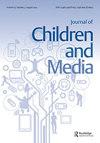Digital rights in digital exclusion settings: the experiences of institutionalised youth in Portuguese detention centres
IF 2.1
3区 心理学
Q2 COMMUNICATION
引用次数: 0
Abstract
ABSTRACT Institutionalised youths who are digitally disconnected while long-standing in detention centres (in Portugal, these are called educational centres) face constraints to their digital rights. Given that most youths already come from deprived contexts, their present and future lives are deeply challenged. This article explores data collected in the participatory project DiCi-Educa, based on institutionalised youths’ digital media production and critical thinking, regarding issues such as digital citizenship, participation, and otherness. Using a participatory action research (PAR) methodology, they were stimulated to widen their views of the world and reflect on their digital rights and acts of participation using digital media. Institutionalised youths’ understandings before the project were centred on the use of social media, video games, illegal downloads, and hacking. Thus, during the project, they were challenged to debate participatory acts using the internet and digital media as tools for social change. The results point to these tools as relevant opportunities to the disconnected settings of the ECs. We recommend the need to tackle critical methods for thinking the digital realm as a path to building critical skills with these youths. Widening their views of the world can stimulate their well-being and contribute to avoiding risky behaviours. IMPACT SUMMARY Prior State of Knowledge: Summarize what is known about the topic. The digital rights experiences of institutionalised youth in detention centres are an under-studied topic in media studies. In addition, there is a lack of research compiling participatory media production and reflection on the uses of the internet in these contexts. Novel Contributions: Summarize the primary contributions the findings make to the field. This study revealed the need to (1) bring digital and technological opportunities to the disconnected youth in detention centres; (2) the need to ensure quality types of digital equipment and a stable broadband connection; at last, (3) it pointed to the necessity to widen youth views of the world and promote non-risky behaviours. Practical Implications: Authors should explicitly state what the practical implications of their findings are, and whether those implications are primarily for practitioners, policymakers, or parents. Our findings primarily target youth and staff in detention centres and secondly policymakers. We suggest to develop (1) longitudinal research and training with institutionalised youth and (2) training for the detention centres staff.数字排斥环境中的数字权利:葡萄牙拘留中心收容青年的经历
摘要长期被关押在拘留中心(在葡萄牙,这些拘留中心被称为教育中心)的制度化青年在数字方面处于脱节状态,他们的数字权利受到限制。鉴于大多数年轻人已经来自贫困的环境,他们现在和未来的生活都面临着严峻的挑战。本文探讨了参与性项目DiCi Educa中收集的数据,该项目基于制度化青年的数字媒体制作和批判性思维,涉及数字公民身份、参与和另类等问题。利用参与性行动研究(标准杆数)方法,鼓励他们扩大对世界的看法,并反思他们的数字权利和使用数字媒体的参与行为。在该项目之前,制度化的年轻人的理解集中在社交媒体、视频游戏、非法下载和黑客攻击的使用上。因此,在该项目期间,他们面临着利用互联网和数字媒体作为社会变革工具的参与行为辩论的挑战。结果表明,这些工具是ECU断开设置的相关机会。我们建议有必要解决将数字领域视为与这些年轻人培养关键技能的途径的关键方法。扩大他们对世界的看法可以刺激他们的幸福感,并有助于避免危险行为。影响总结先前的知识状态:总结对该主题的了解。在媒体研究中,被收容在拘留中心的青少年的数字权利经历是一个研究不足的话题。此外,缺乏对参与式媒体制作的汇编研究,也缺乏对互联网在这些背景下的使用的反思。新颖贡献:总结研究结果对该领域的主要贡献。这项研究表明,需要(1)为拘留中心中与世隔绝的年轻人带来数字和技术机会;(2) 需要确保数字设备的质量类型和稳定的宽带连接;最后,(3)指出有必要拓宽青年人的世界观,提倡无风险行为。实际意义:作者应该明确说明他们的研究结果的实际意义是什么,以及这些意义是否主要针对从业者、政策制定者或家长。我们的调查结果主要针对拘留中心的青年和工作人员,其次是政策制定者。我们建议发展(1)对收容青少年的纵向研究和培训,以及(2)对拘留中心工作人员的培训。
本文章由计算机程序翻译,如有差异,请以英文原文为准。
求助全文
约1分钟内获得全文
求助全文

 求助内容:
求助内容: 应助结果提醒方式:
应助结果提醒方式:


